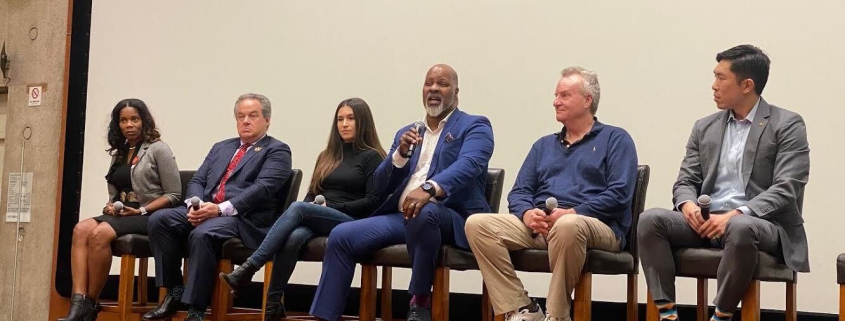USC hosts graduate recruitment conference for minority students

USC welcomed more than 200 prospective students from around the country Friday and Saturday to attend its second annual Minority Serving Institutions graduate and professional recruitment conference, hosted by the Office of Inclusion and Diversity.
The program selected visiting students from Minority Serving Institutions, including historically Black colleges and universities, Hispanic serving institutions, Asian American and Pacific Islander institutions, and native and tribal schools. Student participants received an application fee waiver for up to three graduate programs and their travel expenses were subsidized by the University.
Myra Turner, a professor of journalism and lead organizer of the event, said the application process for minority students to attend this year’s graduate recruitment conference included a GPA requirement and a short personal statement of why they wanted to come to USC.
“I can’t wait to get all of these students in one space so they can see what we’re about and we can hear all about their journeys,” Turner said in a press release.
The recruitment fair kicked off with a welcome reception Friday evening at Wallis Annenberg Hall’s Alumni Patio, where visiting students connected with faculty, administrations, admissions personnel and other students.
Aaron Proctor, a senior majoring in political science at Florida Agricultural and Mechanical University, said he was excited about meeting new people and learning about the resources the University has to offer to its students.
“I want to expand my horizons and go somewhere I haven’t been before to build a network,” Proctor said.
Another prospective student, Ian Evans, who grew up in Inglewood, Calif. and graduated from Tuskegee University with a business administration degree, said he was impressed with the University’s effort to increase the diversity with the graduate students.
“I’m excited about seeing the community here at USC. It’s a campus that I have always admired and respected since I was a young adult and a teenager being here from Los Angeles,” Evans said.
The “In Formation: Dream Big Conference” continued Saturday, with students participating in breakout sessions at different USC schools, going on campus tours conducted by student leaders from the Annenberg Cross-Cultural Student Association, attending featured lectures and joining an alumni panel.
This year, 20 USC schools participated in the Minority Serving Institutions graduate recruitment fair, an increase from 13 in last year’s pilot program. Students who could not participate in person attended a webinar for each school’s information session.
In the breakout session at the School of Cinematic Arts, Desa Monique Philadelphia, an SCA communications and development writer, answered students’ questions about the competitive admission process and what it means to be rejected.
“Whether you get accepted or not, it does not necessarily says anything about your talent and ability … Unfortunately, it’s just a limited number of spots, and so [the admission personnel] are putting together a cohort of who they think will work well together and who have the goals that they think will benefit being in the class together,” Philadelphia said. “The short answer is, please apply again.”

Beyond offering resources for visiting students to help them make graduate school decisions, the conference marks the University’s continuous effort to diversify the student body at the graduate level.
Maddy Brown, a sophomore majoring in journalism, said USC has been a historically white college, so there is always a need to diversify the student body, especially at the graduate level.
“It’s the grad school particularly that has not seen a lot of diversity. The institution does more work to diversify [on the] undergrad [level],” Brown said. “Events like this are really important when [the Office of Inclusion and Diversity] reaches out to historically Black colleges and invites them to look at our school instead of expecting them to do all the work.”
Sara Balanta, a freshman majoring in journalism, recognized that the University has a diverse student body at the undergraduate level, but that the graduate level lacks the same level of diversity.
“I knew [USC] was more diverse compared to other colleges I was looking at. I also think there is a big difference in undergrad and grad,” Balanta said. “You have Somerville, which is the all Black floor and party chair, and there’s a kind of a lot of different outlets where you can find communities of people of color [at the undergraduate level].”
Turner recognized that while recent statistics may indicate there has been some issue with diversity and inclusion, she is glad that University administration supports these types of minority-serving conferences.
“I am hopeful that programs like this will accelerate the effort [to diversify the student body],” Turner said. “We are making positive steps in the right direction.”

